Stephen Roney's Blog, page 197
June 12, 2021
Laying Out the Cards Face-Up
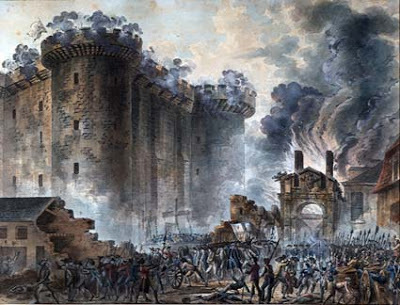 July 14, 1789
July 14, 1789Leftists have traditionally thought of themselves as occupying the moral high ground—they were on the side of the little guy against the established power structures. That is more or less what “left-wing” meant when the term was coined, in reference to the French National Assembly.
I know that well enough. Born on Bastille Day, I always in youth thought of myself as a leftist. Never the Marxist left; but in those days there was a liberal left. I was on the side of human equality and everyone getting a fair shake; I was in principle suspicious of any established power. Toryism was in established power then in Ontario—for an unbroken thirty years. Duplessisism had until recently long been in power in Quebec.
If it were still true a few decades ago, or possibly true, that the left was for the poor and powerless against the rich and powerful right, it is obviously not true today. As we have increasingly seen, most of the visible rich capitalists are somewhere on the left: Bill Gates, Warren Buffett, Jeff Bezos, Mark Zuckerberg, Jimmy Dorsey. The professions and the bureaucrats who control the levers of power are on the left. The institutions are on the left: the schools, the media, the universities, the “mainline” Protestant churches. The big corporations are on the left.
If all or most of the established power structures are on the left, how is it tenable to claim that leftism is on the side of the little guy against the established power structures? Little guys broke into the US Capitol Building on January 6th, and the powerful left did not take it well. They clearly saw such ordinary folk as the enemy, and an unspeakably dangerous enemy. They roundly condemn “populism.”
Granted that the left favours subsidies and direct payments to the poor; more so than the right. But the very rich can afford such payments. Chump change. They can afford, in effect, to buy themselves a good public image with a little of their excess cash. They are not giving private charity here, but demanding that others carry much of the load. Higher taxes pinch harder on the only moderately well-off, and ensure they gather no excess capital to invest.
And such welfare, as opposed, say, to better education, or fewer regulations on starting a business or hiring people, works to keep the poor permanently poor, teaching dependency and punishing initiative. Preserving and deepening the divide between classes.
Then, passing beyond this issue of who is for the rich or for the poor, the powerful or the powerless, on every other issue the left seems to take a position no moral man could go along with. At some point, this has to outweigh their support for the poor in the mind of any decent person, even if this initial claim were true.
A few decades ago, it was possible to be opposed to abortion and be on the left. But more recently leftist parties have declared pro-life, anti-abortion positions heretical and cause for expulsion from the movement. Their choice. Abortion is as grave a moral and civilizational crisis as the Holocaust, or more so—the death toll is greater.
Abortion advocates will object that it is not the same, that an unborn foetus is not a human being. That is the same claim the Nazis made to justify killing Jews. We do not conclude that this made the murders acceptable; we conclude this made them worse. Is conception an arbitrary point at which to say human life begins? One must designate such a point; and what other point is less arbitrary than this one? Conception is clearly less arbitrary than birth. It is obvious nonsense to say that a baby is not human one minute before the head emerges.
The next biggest fault of the left is the wholesale attempt, for decades, to end freedom of speech. This is a mark of guilt—because they know they are wrong on abortion. And this illustrates one reason why we need freedom of speech: because words are powerful, and can keep the powerful from doing wrong in secret. But as we are increasingly seeing, suppressing speech also makes democratic government and civil peace impossible. If matters cannot be discussed, matters must be imposed, by whomever holds the power to do so.
Next to that, and prior to that, is sexual libertinage and the uncoupling of coupling from baby-making. This has come to be systematically celebrated on the left, and having children condemned. Wrapped up in this is feminism, the idea of which, from which all else flows, is that nobody should waste time raising children. This is decadence and self-indulgence in its classic form. This is a perfect recipe for civilizational suicide. Besides the cruelty to the next generation, and the callous attitude to sex partners, this has led inevitably to the greater horror of abortion.
You want to argue that sexual libertinage is freedom? That it is a case of expanding human rights? It is not, and only recently have the two become confused. Freedom classically means freedom to do what you think is right, freedom of conscience. Someone who habitually indulges a vice is not free in any sense, but enslaved by it—think of an alcoholic. We should not want the state to intervene, but we certainly ought not to celebrate it.
And this naturally segues us to the attack on religion. Although there used to be a viable religious left, and the mainstream Protestant denominations are increasingly leftist, this has been at the cost of draining any moral codes out of them. Although Islam has so far been given a pass, otherwise, the left has grown openly hostile to any religion that implies a moral code. Intelligent Muslims must know they are on borrowed time; indeed, it was only a decade or so ago that the left was painting Islam as the greatest enemy, accusing it of repressing women, refusing them fashion choices, and mutilating their genitals. They can and inevitably will flip back to this stance just as quickly, once their immediate tactical objectives are achieved.
The left hates ethical monotheism because it preaches against sexual libertinage and abortion. So the pressing desire to restrict, scapegoat, and discourage religion. This is profoundly harmful to mankind; people need religion, and despair without it. It is also most of the glue that holds society together.
Were all that not enough, the left is increasingly and openly racist. It sees everything in tribal terms: nobody is an individual, everyone exists and thinks only as a member of some “community” or tribe. These tribes are and must remain utterly apart; although they may form coalitions for temporary advantage, there can ultimately be no communion or common cause or even shared reality among them. They are in an eternal and inevitable struggle for power.
This is the core of fascism and of Nazism. And the left is thundering in a handcart down this old track, once abandoned, even though we know where it leads.
Is there any social evil the left has not yet embraced? If so, they will no doubt find it, and do so.
At this point, if anyone claims they support the left because they want to help the poor, I think we have to assume duplicity.
'Od's Blog: Catholic comments on the passing parade.
June 11, 2021
Doug Ford Seizes Dictatorial Powers? Not.
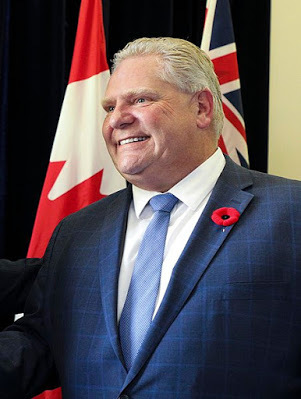 A Ford, but perhaps not a Lincoln.
A Ford, but perhaps not a Lincoln.Some express alarm at Ontario Premier Doug Ford’s declared intent to invoke the “notwithstanding clause“ of the Canadian Constitution in order to override charter rights and allow legislation to limit campaign spending by third parties. I think it is a great idea. Even though I do not feel great about limiting campaign spending by third parties.
A bit of background here: the Canadian Constitution guarantees certain rights and freedoms. The courts can disallow legislation it feels is in violation of these. The legislature can respond by invoking this “notwithstanding clause” and overrule the courts. The legislation goes into effect, but must be renewed every five years.
Critics are objecting that Ford wants to override the Constitution. This is exactly the opposite of the truth: he is invoking the Constitution as written and as intended.
Traditionally, iin the Westminster system, Parliament is the “highest court in the land,” on the premise that the people are sovereign. Giving any court the ability to overrule the people’s representatives risks giving government itself to an oligarchy: those who appoint the Supreme Court justices, the legal profession and its gatekeepers, the professions and the professional classes. Some of the framers of the Canadian Constitution Act, notably Allan Blakeney, insisted on the notwithstanding clause to protect democracy.
It is important to know that a body of skilled lawyers have examined some legislation in detail, and say it is in violation of charter rights. This is helpful information for the public. If the government persists notwithstanding, they can decide to punish the government accordingly at the next election. But we must not surrender the people’s right to make that decision.
And time has proven the framers exactly right. Down in the US, it has come to be expected that Democrat-appointed judges and Republican-appointed judges will vote not according to the Constitution as written, but by party line. And they have become increasingly activist in disallowing legislation.
In Canada, it is worse. The Canadian Supreme Court is appealed to more easily and often. It has not only developed a habit of disallowing legislation but of demanding legislation be passed. And their rulings produce major social changes, without public accountability. They required Alberta to insert a reference to homosexual rights in their proposed provincial charter of rights. They struck down all limitations on abortion. They required the legalization of gay marriage; they redefined aboriginal rights, redefined who is an aboriginal, and on and on. They have developed a dangerous taste for power.
It matters little whether one agrees with this or that ruling, or them all. The power is arbitrary and capricious, and there is no reason to expect it will forever be used in the public interest.
Luckily, unlike the US, Canada has a constitutional remedy in the notwithstanding clause. The only problem has been, until now, a lack of courage among our elected politicians in invoking it. Quebec has used it regularly, but in the rest of Canada, only Saskatchewan, and only once. Doug Ford does us all a favour, and our grandchildren, if he further cements the precedent.
'Od's Blog: Catholic comments on the passing parade.
June 10, 2021
The Alarming Danger of a Return to Saniity

Many people are alarmed about Critical Race Theory in the schools; as in the “1619 Project,” which teaches that America was founded on the institution of slavery. But perhaps you do not realize that Critical Race Theory is just one tentacle of a kraken named Critical Theory that has suckered in far more than the public schools.
I have found a useful overview and summary, written by two declared Critical Theorists, in Critical Inquiry in Language Studies.
The first and perhaps most important point is to take from the paper is that the critical theorists themselves are running scared. One recent CT essay abstract ends with dire word of “a new imperative for survival in what are for many volatile and risky political and media community and civic environments.” The present piece’s abstract concludes: “it is necessary to confront neoliberalism as a new kind of domination.”
Neoliberalism means free market economics and human rights. Its heyday is commonly thought to be the Reagan/Thatcher years. There has been a lot of water under the Potomac bridges since then, and it is not clear that water has been rising. The Democrats just took two houses and the presidency; Trudeau’s Liberals are hunkered down in Canada. The Tories have been crushing it in the UK. In terms of visible politics, a mixed bag.
So how to account for this sense of embattlement? Rather than the votes, I suspect that the Critical Theorists feel they are losing the argument. Neoliberalism is not rising so much as that CT is collapsing, in a logical more than a political sense.
For later in the essay, the authors lament that CT has not accomplished anything.
“Has the increased recognition of critical language studies led to any concrete social change?
The answer is probably no.”
The article diagnoses that Critical Theory has been failing to make proper outreach to educate others. Yet this is an odd claim considering that it monopolizes the schools and universities. Most critical theorists spend most of their day educating undergraduates in their views. The explanation has to be, not that the arguments are not being made, but that they are not convincing. Too few students are genuinely buying the joy juice. Semi-aware that their essential premises are not salvageable, they turn to shouting them louder and more often as the only alternative. Along with suppressing any other voices.
Critical theory is doomed: take it from the horse’s mouth.
'Od's Blog: Catholic comments on the passing parade.
June 9, 2021
London (Ontario) Murders
Every death diminishes me, because I am involved in mankind. Every murder is murder, and there is no discriminating here. Each of us is equally valuable in the eyes of God, and each of us as citizens has a right to equal protection before and from the law.
So it is disturbing that, when someone who is not a Muslim kills a Muslim, it is treated very differently than when someone who is a Muslim kills a non-Muslim.
When someone ran down a visibly Muslim family in London, killing four, it was immediately identified as a “hate crime.” When a Muslim man opened fire on Toronto’s Danforth iin 2018, police insisted and still insist no motive could be found.
You may argue that the circumstances were different. Perhaps so. In the first case, although the perpetrator had at least one close Muslim friend, who insisted he had no anti-Muslim feelings. The perpetrator apparently belonged to no anti-Muslim organizations, there is nothing troubling in his social media, and there is apparently no manifesto. In the second case, ISIS claimed responsibility.
After the Danforth shooting, the authorities and media rushed to insist that, whatever else happened, the most important thing was that Muslims as a group must not be blamed.
In the wake of the London murders, authorities rushed to declare that all the rest of us, all who are not Muslims, are to blame. “This is our Canada.”
This difference in reaction and interpretation could not be more striking, and is obviously discriminatory. Either we are all and only responsible for our individual acts, or all groups must be held equally responsible for the actions of their members.
The authorities and media have called, in the present case, for immediate action against the ideologies that promote such hate. They identify some such ideology called “Islamophobia,” which needs to be banned.
“Hate speech,” in the sense of inciting violence against any identifiable group, is already criminal in Canada. Those who resist further action singling out Islam for special protection fear it might involve making mere criticism of Islam as a religion or political ideology illegal.
And there is another problem. The Quran itself, and the hadith, by a reasonable literal reading, call for Muslim supremacy and violence against non-Muslims. Not just the “jihad” concept, but any legitimate government must be run in accord with sharia law, with different rights for Muslims and non-Muslims. One is obliged to kill “kaffirs,” non-believers, as well as anyone who apostasizes from Islam.
One may well insist that such passages do not mean what they might appear to mean by said literal reading; but ambiguity is not allowed as a defense of hate speech elsewhere. The worst interpretation is always assumed.
In other words, if we are going to fairly enforce even the existing laws on hate speech, Islam itself would have to be banned.
I think it is a given that we cannot criminalize a major world religion. Not just for practical reasons, but because after the right to life, freedom of conscience is the most fundamental of all rights.
Accordingly, beyond the argument from freedom of speech, which is honoured in the US, and is supposedly guaranteed in the Canadian constitution, we simply cannot have hate speech laws, cannot ban even eliminationist hate speech. Troubling as it might seem to most, the alternative is worse.
Especially for Muslims.
'Od's Blog: Catholic comments on the passing parade.
June 5, 2021
The Real Argument for Monarchy
Two Canadian YouTubers, JJ McCullough and Useful Charts, have recently put out competing videos for and against the proposition “Should monarchies still exist in the 21st Century/” I think neither mounts the proper case for monarchy. Although nominally in favour of their continued existence. Useful Charts condemns absolute monarchies as having no place, and rejects monarchy for Canada as unsuitable for a multicultural society. I disagree with both assertions.
The essential value of a monarchy, neither seem to understand, is that it puts a human face on the nation. Without something of that sort, people will not work for the mutual benefit, but will pursue self-interest. And it is not just an individual human face, but a family—it models the nation as a family, which is an ideal model. If we all think of one another as family, given normal human instincts, we will treat one another better.
Some states can feel familial without this, because the population is genetically related; they are in fact, in a sense, a very large family. Precisely because Canada does not have that, and because that alternative approach leads almost necessarily to racism and discrimination against ethnic minorities, a monarchy is especially valuable to Canada.
A monarchy is the almost necessary alternative to the nation state. And the nation state, emerging largely in the late 19th and early 20th century, has not had a great track record for human rights and social tranquility.
Aside from cases in which a monarchy might be needed to replace absent ethnic bonds, monarchies seem to work better than ethnic bonds themselves in maintaining good social order.
Think of nations most notable for general social tranquility, for social peace. What countries come to mind? Scandinavia, Britain, Canada, Japan, perhaps the Netherlands. Mostly monarchies. Now compare the major democratic republics: the US, France, Germany since 1918. Placid and prosperous most times, but undergoing periods of tumult, revolution or near-revolution, violence in the streets.
Turkey overthrew the monarchy after the First World War: a period of civil war and ethnic cleansing followed. Russia threw off its monarchy in 1917: a period of civil war and ethnic cleansing followed. Germany threw off its monarchy in 1918; a period of civil war and ethnic cleansing followed. France threw off its monarchy in 1789: a period of civil war and ethnic cleansing followed. Britain temporarily threw off its monarchy in 1649. Ask Ireland about ethnic cleansing under Cromwell.
Useful Charts objects that Queen Elizabeth represents only one Canadian ethnicity. Which ethnicity does he mean? Her recent ancestors are mostly from Germany; she is not ethnically English. Her husband is officially Greek, but raised in France. In 1914, the King of England, the Czar of Russia, and the German Kaiser were first cousins. To think of any royal as any given ethnicity or another is nonsensical.
A monarch is an ideal unifying figure for a multi-ethnic state.
Useful Charts worries that the monarchy is especially offensive to Canadian First Nations. This is the opposite of the truth on the ground. Canada’s First Nations prefer to deal with the monarchy, because it implies they have sovereignty; their treaties are with her. Canadian courts are obliged to give them the benefit of the doubt, because of a supposed need to uphold “the honour of the crown.” Compare, as a result, the peaceful relations between First Nations and the government in Canada to the frequent Indian Wars in US history.
JJ McCullough argues that the premise behind monarchy is offensive: that they hold their positon by divine right. This has never been an accepted concept. The Glorious Revolution established as a legal principle that the British, and so the Canadian, monarch holds her position at the sufferance of parliament, not God. Other royal families have similar checks, even supposedly absolute ones. The Saudi King is selected by a consensus of the ruling family, and the family must ultimately stay on the good side of the religious authorities.
Useful Charts argues that modern monarchs hold their position due to their popularity, which is not quite the same thing. McCullough seizes on this to argue that, if popularity is the basis, they should run for office to prove this; therefore, any monarchy should be replaced by an elected leader.
But there is an important and valuable difference. A politician must run for office. To reach the top of that greasy pole, or to want to, requires an entirely unnatural lust for power and fame. This means, necessarily, that his or her values are distorted, and in a dangerous direction. By making the titular leader hereditary, this is avoided, at least for this position. While the modern monarch may have few powers, they are at least one sane voice at the top of government, that the politicians will want to and feel some need to please.
Useful Charts, in condemning absolute monarchies absolutely, does not grasp another important factor. For some societies, democracy is not viable; there is not a sufficient cultural tradition of disagreeing with one another politely, keeping to set rules of engagement, retiring peacefully in defeat, and not exacting revenge on your rivals in victory. All of this goes against human instincts. In such a culture, the only possibilities are a self-appointed dictatorship or a monarchy. Then, monarchy is infinitely preferable. One rises to dictatorship in such a country by being more ruthless than the next guy, and having ta stronger lust for power. For a dictator, the temptation is also to loot the country for everything you can, for you might one day lose power to another just like you. Even if you do not, one day you die, and some stranger takes everything you built. Why build?
But for a monarchy, being a ruling family, the natural instinct is to keep the country intact and, ideally, improved, for the children. You know them personally, think of them fondly, and want them to remember you well.
Compare the monarchies with the republics of the Muslim world. Monarchies: Saudi Arabia, Oman, Qatar, UAE, Bahrain, Jordan, Morocco, Malaysia. Republics: Yemen, Syria, Iraq, Iran, Egypt, Libya. Who is more peaceful? Who has more human rights? Who is more prosperous?
A monarchy also allows for Plato’s ideal leadership. Knowing in childhood he or she is likely to inherit specific responsibilities, a child can be educated for the position. This is not practically possible for elected leaders in a republic, because their success is unpredictable and, individually, highly unlikely. Every one of them is going to be, at best, a talented amateur.
The two things that might be said against a monarchy is that it costs money for a relatively idle position, and it violates the spirit of human equality.
But in Canada’s case, it actually costs us nothing. In other cases, there is no rule or monarch’s union requiring any particular level of pay. And as for human equality, if it ain’t broke, don’t fix it: philosophical concerns about modelling human equality aside, monarchies have a good track record. As Useful Charts points out, some of the countries with the highest level of actual income equality, not to mention the highest level of human rights, are monarchies. Historically, a strong monarchy has always meant a weaker upper class, and vice versa: in France, in the UK, in Japan, in China, everywhere. That may necessarily be true.
'Od's Blog: Catholic comments on the passing parade.
June 2, 2021
Genocide in Kamloops?
I have been puzzled about what the Kamloops Residential School is accused of, given preliminary reports of the discovery of 215 bodies in a “mass grave” somewhere near the grounds. So what?
Now I know: I just saw a video clip of National Chief Perry Bellegarde accusing the school of “genocide.” Chief Bobby Cameron of Saskatchewan accused it of “first degree murder.”
Unmarked mass graves have been uncovered on the banks of the Rideau Canal, and in downtown Kingston, Toronto, and Montreal, and nobody has thought to accuse anyone of either murder or genocide. These were Irish immigrants who died of malaria, cholera, or typhus. We know tuberculosis was a severe problem among native children. Why would anyone assume murder? We stop seeing things rationally as soon as “First Nations” are involved.
Another YouTube clip interviewed an expert on ground-penetrating radar of the sort used in Kamloops. She explained that this technique cannot detect any actual bodies: only the disturbance of the dirt from the digging of a grave, or a coffin.
In other words, in order to be able to produce a number “215” the people studying the Kamloops site must have discovered 215 separate burials.
The next question: how, were the initial reports able to claim that those buried included “children as young as three.” No bodies were visible, let alone forensically examined. Surely this can only have been estimated from the size of the coffins. These children seem to have been buried in coffins, not just put in the ground.
It is odd to call this a “mass grave.” Mass graves are what were found along the Rideau. These are, rather, individual unmarked graves.
Possibly they were not always unmarked. They might have been marked by wooden crosses that have decayed away.
We can only guess; but mass murder or genocide is about the least likely explanation available.
'Od's Blog: Catholic comments on the passing parade.
May 31, 2021
Israel a Colonial Enterprise?
 UN Mandate, 1948
UN Mandate, 1948I note people accusing the Jews of stealing land from the Arabs in order to form the state of Israel. One correspondent compares the Israeli position to Italians laying claim to England on the grounds that it once belonged to Rome.
But that is not a fair representation of the history. The Jews did not take the land. Israel was mandated to the Jews in 1948 by the United Nations. If there was an injustice done to the Palestinian Arabs, it was done by the international community, not by the Jews. Canada had a vote in the UN General Assembly; the Jews did not. To blame the Jews is scapegoating.
What do those who make this argument now propose? That the Jews, having been legally ceded the land by the UN generations ago, are now to be evicted due to the claims of some prior inhabitants? Aren’t such theorists guilty here of exactly what they are falsely blaming the Jews for?
If dispossessing the Arabs was wrong then, by the same standard, dispossessing the Jews would be wrong now.
I would allow that the original grant was unfair to the Arabs. The world community was giving the Jews someone else’s land. The recent attempt by Hitler to exterminate them no doubt made it seem pressing to the international community that the surviving Jews be given their own homeland, where they might be secure from such mass murder.
Wherever that homeland was established, it was going to require the dispossession of whoever was currently living there.
Perhaps it would have been more just to give the Jews a slice of Germany, rather than taking land from the innocent Arabs. But then, a small Jewish state would never seem secure from bigger neighbours in Central Europe. Ask Poland about that.
Perhaps Canada should have offered some of its own territory, rather than voting to give the Jews some of the Arabs’.
But then, Britain was indeed altruistically giving some of its own territory for the creation of this Jewish homeland. Britain had conquered the territory from the Ottomans in the recent World War.
And Palestine made the most sense, not necessarily because it was the ancient homeland of the Jews, but because it had the largest concentration of Jews anywhere.
This was largely because of its symbolic important to the Jews, and largely because the British had already been legally bound, by League of Nations Mandate in 1922, to create in Palestine a homeland for the Jewish people. Accordingly, they were more or less bound to allow Jewish immigration into the area.
Stalin made a parallel attempt to set up a Jewish homeland in Siberia, but got little uptake.
The only solution I can see is acceptance of the status quo.
'Od's Blog: Catholic comments on the passing parade.
May 29, 2021
Indigenous Health and Cultural Safety
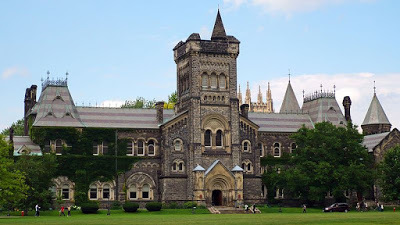 University College, U of T
University College, U of TAre the universities salvageable? Would it make more sense now to just close them and start again?
Looking at recent faculty openings for any established mainstream university is disheartening.
The University of Toronto is currently calling for a tenure-track instructor in “Indigenous Health and Cultural Safety” for the Dalla Lana School of Public Health, the Temerty Faculty of Medicine, and Women’s College Hospital. Both parts of that discipline title are troubling. Is indigenous health different in principle from the health of humans in general? Should it be studied separately? What can this imply but discrimination? But a fundamental difference in kind among people, that would justify different treatment?
And what is “cultural safety,” and what does it have to do with one’s health?
“Excellent Indigenous knowledges methodology skills are essential.” Is “indigenous knowledge” different in kind from human knowledge? If aboriginal groups “know” differently than the majority, there is presumably no chance for integration. If their reality is different, any conceivable action against them might, in principle, be justified.
“Preference will be given to candidates who self-identify as Indigenous. Recognizing that there are a variety of terms that potential candidates may use to self-identify, the University uses the term ‘Indigenous’ in this search, which forms part of the U of T Response to Canada’s Truth and Reconciliation Commission, to encompass the people of Turtle Island, including those who identify as First Nations, Métis, Inuk (Inuit), Alaska Native, Native American, and Native Hawaiian people.”
Those who have posted the job notice do not seem to understand that “Turtle Island” refers to the entire Earth, indeed the cosmos, not to any one geographical area. Accordingly, anyone native to the cosmos should properly identify as “indigenous.”
But it is just as well, since hiring someone on the basis of their race is a violation of the Canadian Constitution and of human rights.
Perhaps this descent into objective madness was inevitable once the universities lost their religious raisons d’etre. They are now like ancient masted ships without a keel or anchor. They blow any which way, or no way at all.
'Od's Blog: Catholic comments on the passing parade.
Deaths at the Kamloops Residential School
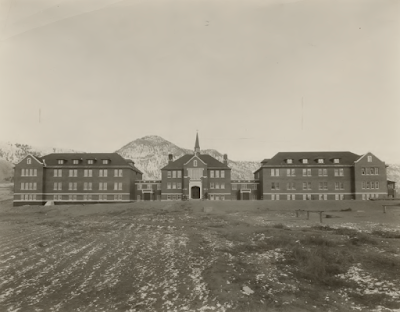 Kamloops Residential School
Kamloops Residential SchoolThe lead item in the Canadian national news yesterday was the discovery of 215 child corpses in an unmarked grave somewhere near the old residential school on the T’kemlups reserve in Kamloops, BC.
Should this be big news? Each of those deaths is terribly sad; it is sad that they were not better commemorated. But is there anything truly surprising or scandalous here?
To begin with, this is a preliminary report. No excavation has been done, the site has not been disclosed, and no images have been released. Preliminary reports are usually false. If there is a scandal, it is too soon to say so.
The old T’kemlups residential school is not in some remote location. It is iin plain view of downtown Kamloops. It is the most prominent building on the T’kemlups reserve, which is surrounded, or bordered, by the city on two sides.
If there was something untoward going on here, if children were being killed or even buried secretly in unmarked graves on the T’kemlups reserve, where was the band council? What was their responsibility? What about the municipality of Kamloops? Where were the parents? Did they not notice one of their children was missing?
Given the school’s central location, it even seems less than certain that any burial ground near the school was used exclusively by the school. These preliminary reports claim that the remains of children as young as three were found—below school age.
Perhaps the band council has simply found the local “Potter’s Field.”
Let us suppose, however, that the burials are from the school, and the number given is accurate. It may seem shocking to us today that a school-age child might die, but deaths of children were common only a few generations ago. In Tom Brown’s School Days, the classic account of Rugby School in the 19th century, Tom’s best friend is taken off by scarlet fever. In 19th century Canada, an estimated one third to one half of all children died before the age of five. They fell from the general run of childhood diseases, from scarlet fever, from polio, from Spanish flu, from smallpox, and above all from tuberculosis.
The Kamloops school ran as a residential school for 79 years. Two hundred and fifteen deaths over 79 years is 2.72 deaths per year. The school, I read, hosted 500 students. That means a death rate of 0.54% per year. This does not sound particularly high for the time. Especially since tuberculosis was a special problem in the residential schools—reputedly 4.9 times the national average.
If that sounds like a condemnation of the schools, the tuberculosis rate on reserves in general was eight times the national average. In 1909, two physicians examined 243 Indian children awaiting admission to residential schools in Calgary. They reported that “in no instance was a child awaiting admission to school found free from tuberculosis.” A study of 175 school-age Indian children in Saskatchewan in 1922 reported that 93 percent showed evidence of tuberculous infection.
Some children were bound to die. Sad that they were not given a more dignified burial; but where were the parents to arrange it? If the parents were too poor, or did not care, where was the band council? Where were the municipal authorities? The provincial authorities? The federal authorities? The local churches? Perhaps everyone simply thought it was somebody else’s responsibility.
'Od's Blog: Catholic comments on the passing parade.
May 25, 2021
Moderation as a Moral Value
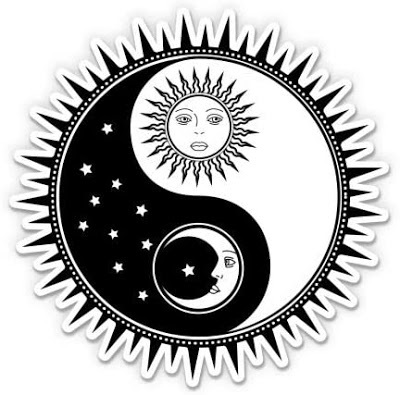
Friend Xerxes has his own definition of sin: “I define sin as taking something good, beneficial, healthy, and pushing it to an extreme. Too much, or too little.” Life, then, is a matter of balancing opposites.
Carl Jung believed in something similar. He credited the concept to Gnosticism. It is also perhaps reflected in the yin-yang symbol familiar in the Far East.
This is not the Christian idea, and it does not work.
For balance itself, being a value, must be balanced by its opposite. Moderation must not be pushed to an extreme, or one is immoderate. One must be only half-balanced. And “the good” must not be pursued, but must be balanced by evil, or – or evil happens? Too much good is not good?
In other words, the concept produces immediate self-contradictions.
And can we hold that there is such a thing as too little rape and murder? What amount of each would be just enough? By what standard can we judge this, or anything, if there are no absolute values?
Christianity holds, instead, along with ancient Greek thought, that there are absolute values: one cannot have too much good, too much truth, or too much beauty.
'Od's Blog: Catholic comments on the passing parade.



